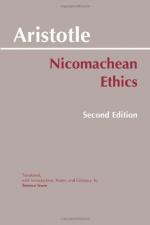|
This section contains 521 words (approx. 2 pages at 400 words per page) |

|
Ethics Summary & Study Guide Description
Ethics Summary & Study Guide includes comprehensive information and analysis to help you understand the book. This study guide contains the following sections:
This detailed literature summary also contains Topics for Discussion on Ethics by Baruch Spinoza.
Spinoza's Ethics is one of the most difficult books in philosophy. It is notoriously obscure, as Spinoza invents a variety of new terms and attempts to layout the book like a geometric proof. At this period in philosophical history, philosophers were extremely impressed both with geometry and the physics of Newton and Leibniz. As a result, they attempted to mimic these mathematical and scientific methods. Thus, to understand the Ethics, you must be prepared for obscure, mathematical arguments that often hide what is going on. Further, the book is littered with terms that you will be unfamiliar with and ones that you will be familiar with but that Spinoza has given a distinct meaning.
The Ethics covers many issues other than ethics. Spinoza is a system builder and believes that our ethical lives, the nature of the good, right action, etc. can only be understood within the context of a general philosophy. Thus, Part One focuses on the ultimate ground of all being, i.e., God. God is not the God of classical theism. Instead, it is the only 'substance' in the universe and contains all other things in terms of its 'attributes' as 'modes.' Thus we do not have independent existence, but exist as modes of God.
Part Two covers the nature and origin of the mind. God is the only thing that truly exists. We are modes that are manifestations of his two attributes (that we know of) - thought and extension. Thus we have both a mind and a body, yet we are ultimately one thing. Our body and mind operate in parallel and can affect one another. The mind is composed of ideas, rather than the sort of thing that entertains them.
Part Three concerns the nature of the emotions. In it, Spinoza distinguishes between actions and passions, the nature of things to 'endeavor' towards their self-preservation, and understands goodness and badness in terms of pleasure and pain. Desire, pleasure and pain are the primary emotions and all other emotions are combinations of them.
Part Four covers both the idea of human 'servitude' and the strength of the emotions. Spinoza focuses on the nature of the active life. We pursue the good and avoid the bad; virtue is the power to do the good, the power of reason to rule the emotions. Rational control is hard to achieve but it is possible. We are only free when our actions are determined by our reason alone.
Part Five covers the nature of the good life and true religion. The good life is acting on pure reason and coming to understand ourselves. To the extent that we understand ourselves, we understand God. The love of God derives from this understanding. We can achieve a kind of immortality, but one acts from a bad motive if one is good due to seeking eternal life. This brief summary contains many complex ideas that can only be understood through carefully reading the text. However, understanding the Ethics is a significant achievement and helps one to understand not only the history of philosophy but the history of ideas.
Read more from the Study Guide
|
This section contains 521 words (approx. 2 pages at 400 words per page) |

|



